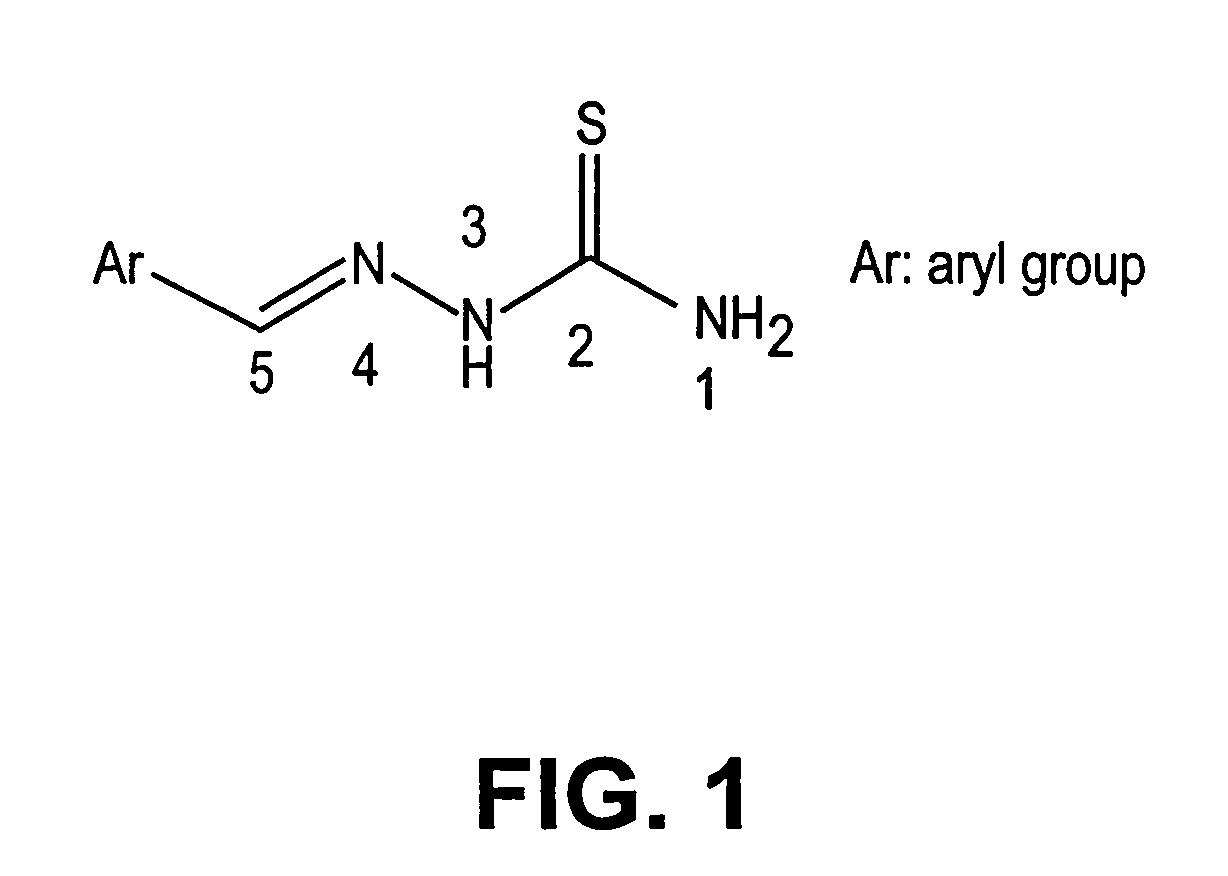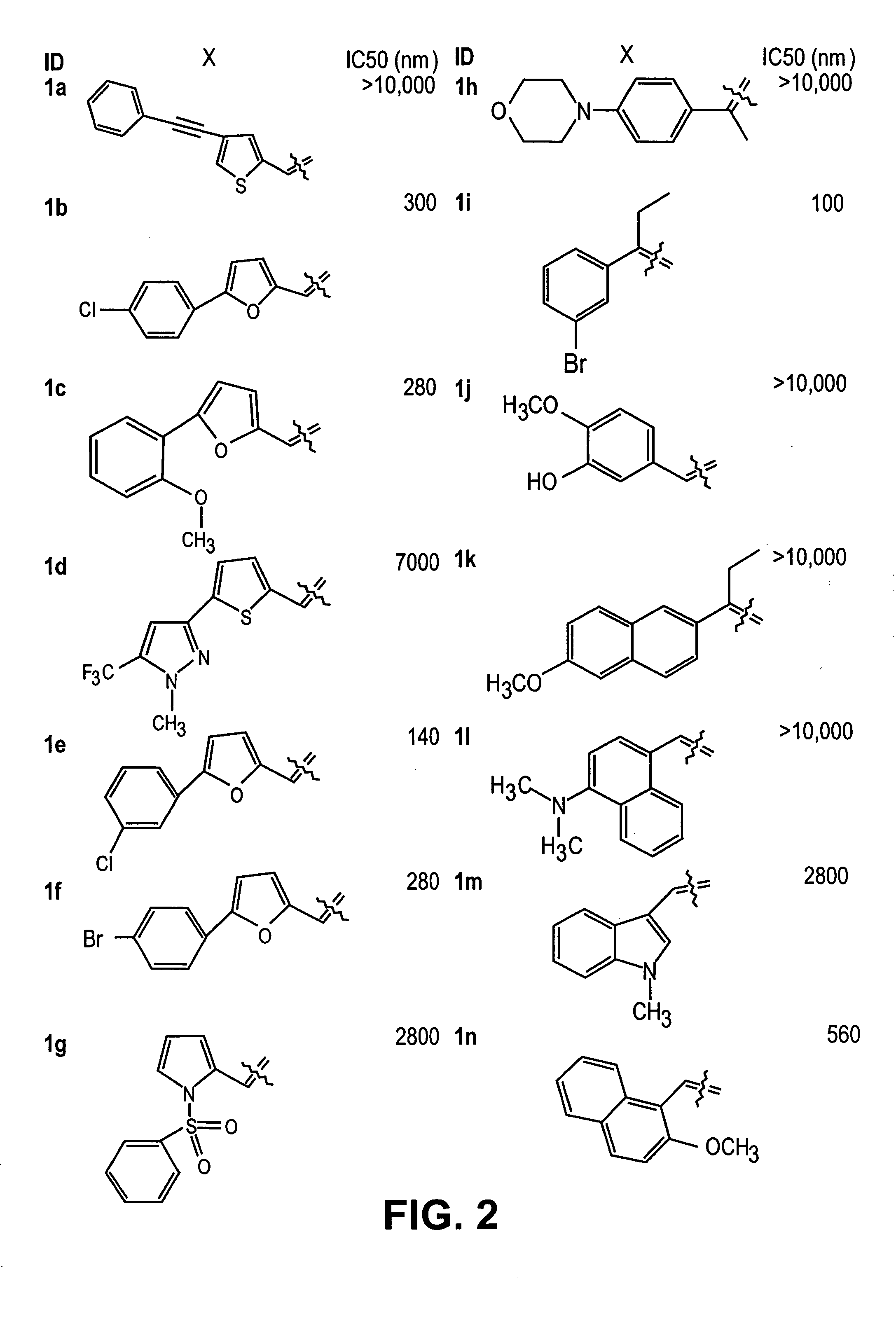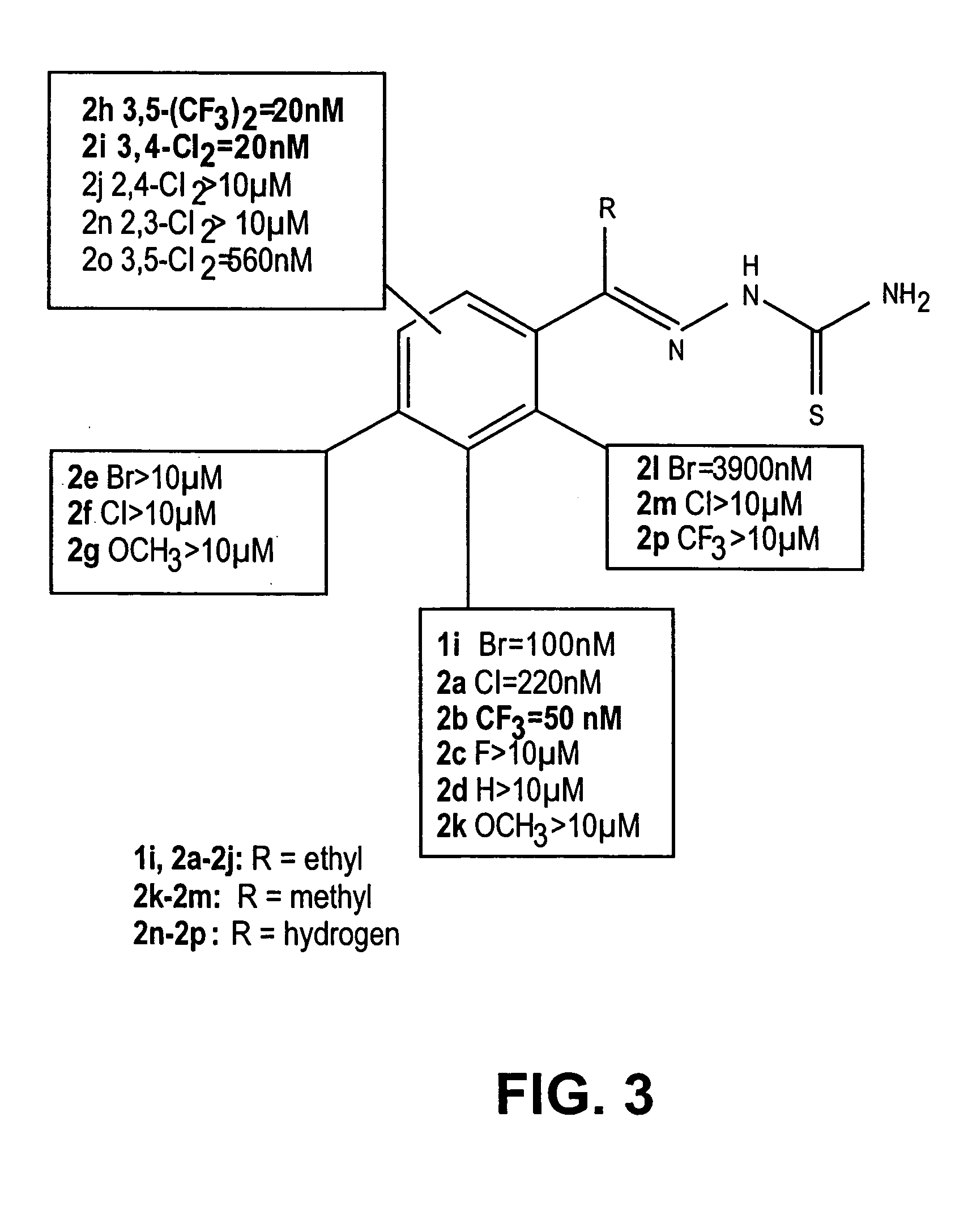Thio semicarbazone and semicarbozone inhibitors of cysteine proteases and methods of their use
a technology of cysteine protease and semicarbazone, which is applied in the direction of heterocyclic compound active ingredients, biocide, animal repellents, etc., can solve the problems of chloromethyl ketones, current prescription pharmacological compounds, malaria, leishmaniasis, etc., and achieve the effect of inhibiting a target cysteine proteas
- Summary
- Abstract
- Description
- Claims
- Application Information
AI Technical Summary
Problems solved by technology
Method used
Image
Examples
example 1
Determination of the Characteristics of the Compounds
[0183] Melting points were determined in open capillaries with a Büchi melting point apparatus, B-540 (Switzerland). Infrared spectra were recorded in an Impact 400 spectrophotometer for a representative set of compounds. 1H NMR spectra were obtained with a Varian Inova-400 NMR spectrometer. Unless otherwise noted, all spectra were recorded with DMSO as solvent. Splitting patterns are designated as follows: s, singlet; br s, broad singlet; d, doublet; t, triplet; q, quartet; m, multiplet. Coupling constants (J) are given in hertz. Mass spectral analyses are performed at the Mass Spectrometry facility, University of California, San Francisco. Elemental analyses are carried out by Atlantic Microlab, Inc., Norcross, Ga. Unless otherwise stated, yields for the reactions are higher than 90%.
example 2
General Procedure for the Preparation of Thio Semicarbazones
[0184] Aldehyde or ketone (0.5 mmol) and thio semi-carbazide (0.5 mmol) was added to a dry flask. The mixture was dissolved in 10 mL of anhydrous MeOH. For ketone, 1% acetic acid (0.1 mL) was also added to the reaction. The reaction was heated to reflux under nitrogen. Thin Layer Chromatography (TLC) was used to monitor whether the reaction was complete. The reaction time ranged from 3 h for aldehydes to overnight for ketones. The solvent was removed in vacuo, and the resulting solid was rinsed or recrystallized.
example 3
Characteristics of the Thio Semicarbazone Compounds
[0185] Data for 4-(Phenylethynyl)thiophene-2-carboxyaldehyde Thio Semicarbazone (1a): mp 197.6-199.6° C.; 1H NMR δ 7.42 (m, 3H), 7.52 (m, 2H), 7.60 (s, 1H), 7.66 (br s, 1H), 7.95 (s, 1H), 8.19 (br s, 1H), 8.25 (s, 1H), 11.52 (s, 1H); HRMS (EI) m / z (M+) calcd for C14H11N3S2 285.0394, found 285.0403.
[0186] Data for 5-(4-Chlorophenyl)-2-furancarboxaldehyde Thio Semicarbazone (1b): mp 199.2-200.8° C.; 1H NMR d 7.06 (d, 1H, J=3.2), 7.16 (d, 1H, J=3.6), 7.49 (d, 2H, J=8.4), 7.77 (br s, 1H), 7.85 (d, 2H, J=8.0), 7.96 (s, 1H), 8.28 (br s, 1H), 11.50 (s, 1H); HRMS (EI) m / z (M+) calcd for C12H10CIN3OS 279.0233, found 279.0237.
[0187] Data for 5-(2-Methoxyphenyl)-2-furancarboxaldehyde Thio Semicarbazone (1c): mp 209.5-211.1° C.; IR (neat, cm−1) 3389, 3234, 3138, 3051, 2983, 2930, 2839, 1603, 1545, 1487, 1343, 1299, 1241, 1101, 1019, 923, 845, 797, 759; 1H NMR δ 3.92 (s, 3H), 7.04 (m, 3H), 7.13(d, 1H, J=8.8), 7.33 (t, 1H, J=7.8), 7.76 (br s, ...
PUM
| Property | Measurement | Unit |
|---|---|---|
| time | aaaaa | aaaaa |
| time | aaaaa | aaaaa |
| time | aaaaa | aaaaa |
Abstract
Description
Claims
Application Information
 Login to View More
Login to View More - R&D
- Intellectual Property
- Life Sciences
- Materials
- Tech Scout
- Unparalleled Data Quality
- Higher Quality Content
- 60% Fewer Hallucinations
Browse by: Latest US Patents, China's latest patents, Technical Efficacy Thesaurus, Application Domain, Technology Topic, Popular Technical Reports.
© 2025 PatSnap. All rights reserved.Legal|Privacy policy|Modern Slavery Act Transparency Statement|Sitemap|About US| Contact US: help@patsnap.com



